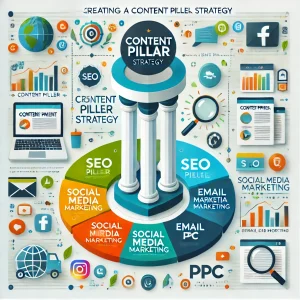Definition and Role of Content Marketing: A Comprehensive Overview
Content marketing has become an integral part of any successful marketing strategy. Businesses across the globe, regardless of size or industry, have adopted content marketing to engage with their audience, build brand awareness, and drive meaningful customer actions. But what exactly is content marketing, and what role does it play in today’s digital marketing landscape? This article provides a comprehensive overview of content marketing and its significance.
What is Content Marketing?
Content marketing refers to the strategic approach of creating and distributing valuable, relevant, and consistent content to attract and engage a target audience. Unlike traditional advertising, which focuses on direct promotion, content marketing provides informational or entertaining material to establish a relationship with potential customers. This content can take many forms, including blog posts, social media content, videos, infographics, eBooks, webinars, and more.
The key objective of content marketing is not just to raise brand awareness but to foster long-term customer relationships that lead to higher conversions, sales, and loyalty. By offering valuable content that addresses customers’ pain points, businesses can position themselves as industry leaders and trusted advisors.
The Role of Content Marketing in Today’s Digital Landscape
Content marketing plays several key roles in the modern marketing ecosystem. Here are some of its primary functions:
- Building Brand Awareness
One of the most important roles of content marketing is to increase brand visibility. High-quality content resonates with audiences and captures their attention. Whether it’s through blog posts, videos, or social media updates, content marketing helps businesses stay top of mind. Consistent delivery of valuable content allows brands to expand their reach and attract new audiences who might be interested in their products or services.
- Anchor Text Example: Discover how content marketing strategies can boost brand awareness. Learn more about effective brand visibility through content.
- Establishing Trust and Authority
Content marketing allows businesses to showcase their expertise and build authority within their industry. By providing educational and insightful content, brands position themselves as thought leaders. Customers are more likely to trust a brand that offers valuable, non-promotional information over one that focuses solely on selling products or services. Over time, this trust fosters loyalty, turning one-time visitors into repeat customers.
- Anchor Text Example: Establish your brand’s credibility with engaging content. Explore how content marketing builds trust.
- Improving SEO and Organic Traffic
SEO and content marketing are inseparable. When businesses create high-quality, well-optimized content, they increase their chances of ranking higher on search engine result pages (SERPs). SEO content marketing includes practices such as keyword research, content optimization, and link building to improve a site’s search rankings. A well-executed content marketing strategy can significantly increase a site’s organic traffic, as it ensures content is discoverable by users actively searching for solutions.
- Anchor Text Example: Enhance your website’s organic traffic with strategic SEO content marketing. Find out how SEO practices elevate content marketing.
- Lead Generation and Conversion
Content marketing plays a crucial role in lead generation and conversion. Through informative blog posts, engaging videos, and downloadable resources, businesses can capture the interest of potential customers. Offering value in exchange for contact information (such as email addresses) allows brands to nurture leads through targeted follow-up campaigns.
- Anchor Text Example: Leverage content marketing to generate quality leads and conversions. Learn more about lead generation through content.
- Customer Retention and Loyalty
After the initial sale, content marketing continues to play a role in maintaining customer relationships. By offering ongoing valuable content, businesses can keep customers engaged and informed, ensuring that they continue to interact with the brand. This can include post-purchase content such as tutorials, success stories, or community-building initiatives.
- Anchor Text Example: Retain and engage customers with valuable content marketing strategies. Explore techniques for improving customer retention.
Key Components of a Content Marketing Strategy
To ensure success, businesses need to develop a comprehensive content marketing strategy that aligns with their overall marketing objectives. Here are the main components to consider when developing a strategy:
- Understanding Your Audience
The first step in any content marketing strategy is to understand your audience. This includes identifying their pain points, challenges, preferences, and behaviors. Creating detailed buyer personas helps tailor content to the needs of your ideal customers.
- Anchor Text Example: Creating buyer personas is crucial for personalized content marketing. Discover how to develop accurate buyer personas.
- Setting Clear Goals and Objectives
Defining specific, measurable goals helps businesses track the effectiveness of their content marketing efforts. Whether the goal is to drive traffic, increase leads, or enhance brand awareness, setting clear KPIs (Key Performance Indicators) ensures that content efforts are aligned with business objectives.
- Anchor Text Example: Setting clear goals improves the effectiveness of your content marketing strategy. Learn how to set SMART goals for content.
- Content Creation and Distribution
Content creation and distribution are essential for ensuring that the right message reaches the right audience. Content should be high-quality, relevant, and aligned with the interests of your target audience. Distribution channels, such as social media, email, and website blogs, should be optimized for maximum reach.
- Anchor Text Example: Master content creation with our expert guide. Check out tips for creating engaging content.
- SEO Optimization
SEO plays a key role in the success of any content marketing strategy. Integrating keyword research, on-page SEO optimization, and backlink building into your content ensures that it ranks well on search engines. Consistently optimizing content for SEO can drive organic traffic and increase visibility.
- Anchor Text Example: Boost your SEO rankings with effective content marketing. Learn how to optimize content for SEO success.
- Measuring Content Performance
To measure the success of your content marketing efforts, it’s essential to track performance through analytics tools. Key metrics to track include website traffic, engagement rates, conversion rates, and lead generation. By monitoring these metrics, businesses can continuously refine and improve their content strategy.
- Anchor Text Example: Measuring performance is essential for refining your content marketing strategy. Explore how to track and measure content success.
Conclusion
In today’s digital age, content marketing plays a vital role in helping businesses connect with their audience, build brand loyalty, and drive profitable customer actions. By producing valuable, relevant content, companies can position themselves as thought leaders, improve SEO rankings, and enhance customer engagement. Whether you’re a small startup or a large enterprise, understanding and implementing effective content marketing strategies can lead to long-term success.
By understanding the definition, role, and core components of content marketing, businesses can leverage it to stay ahead of the competition and build meaningful, lasting relationships with their customers.




Leave a Reply